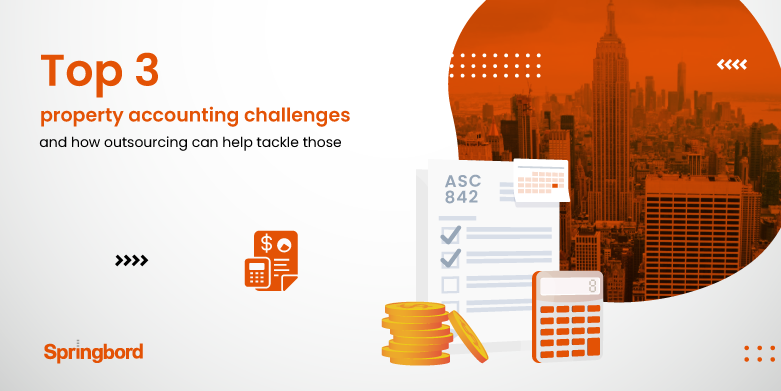 Read time 8 min
Read time 8 minReal estate transactions are complex operations involving purchasing, selling, or leasing properties. These transactions are critical in the real estate sector but can be challenging and complex to navigate. Property accounting accuracy and efficiency are essential in real estate transactions.
Property accounting enables efficient financial management and facilitates transparency and compliance. This post will look at the importance of property accounting in real estate transactions and the complexities involved in effectively navigating these complicated transactions.
Understanding Real Estate Transactions
Real estate transactions encompass various activities, including buying, selling, leasing, and more.
Let’s delve into the critical aspects of understanding real estate transactions.
A. Types of Real Estate Transactions:
- Buying: The process of acquiring property by an individual or entity for personal use or investment purposes.
- Selling: The act of transferring ownership rights of a property from the seller to the buyer in exchange for monetary consideration.
- Leasing: This involves renting a property to a tenant for a specific period, usually through a lease agreement.
B. Legal and Regulatory Considerations:
Real estate transactions are subject to various legal and regulatory requirements that vary by jurisdiction. Some essential considerations include:
- Property Ownership: Property ownership verification includes title searches and ensuring there are no liens or other claims against the property.
- Contracts and Agreements: Drafting and revising contracts and agreements, such as sales contracts, leases, and purchase agreements.
- Zoning and Land Use: Land use and zoning laws must be followed, which limit how a piece of property can be developed and used.
- Disclosure Requirements: Disclosing any known defects or issues related to the property, such as structural problems or environmental hazards.
C. Key Stakeholders Involved:
Real estate transactions typically involve several stakeholders, each with distinct roles and responsibilities:
- Buyers and Sellers: Buyers and Sellers are the two main participants in a transaction who must agree on the deal’s price, terms, and conditions.
- Real Estate Agents and Brokers: Agents and brokers in real estate are professionals who act on behalf of buyers and sellers to aid in acquiring, promoting, and selling real estate.
- Attorneys: Lawyers are relied upon to render legal counsel, examine contracts, and guarantee adherence to rules and regulations.
- Lenders and Financial Institutions: Lenders and financial institutions should offer potential means of funding and assess the deal’s economic viability.
- Inspectors and Appraisers: Inspectors and appraisers are fifth on the list since they evaluate the property’s state and price.
- Governmental Agencies:
Involved in approving, issuing permits, and ensuring building codes and regulations compliance.
To successfully navigate the complicated processes involved in real estate transactions, it is vital to have a thorough understanding of the different types of transactions, the relevant legal and regulatory concerns, and the main stakeholders involved. It helps people and organizations understand their options, defend their rights, and follow the rules.
The Role of Property Accounting in Real Estate Transactions
Property accounting is a specialized branch of accounting that focuses on the financial management and reporting of real estate assets.
Financial data about real estate (whether residential, commercial, or industrial) is recorded, analyzed, and interpreted. Property accounting covers various tasks, such as recording financial transactions, handling budgets, determining asset values, and generating financial reports.
- Importance of Accurate Financial Reporting in Real Estate Transactions:
Accurate financial reporting is paramount in real estate transactions due to several crucial reasons:
- Informed Decision-making: First, financial information is crucial for buyers, sellers, investors, and lenders to make educated decisions in real estate transactions.
Accurate financial reports help gauge a property’s financial well-being and performance, allowing stakeholders to spot lucrative opportunities and avoidable dangers.
- Compliance and Transparency: Real estate transactions involve significant investments and legal obligations. Accurate financial reporting fosters openness and trust by adhering to applicable accounting standards, tax legislation, and financial disclosure requirements.
- Risk Mitigation: Real estate investments are complicated and vulnerable to market swings, so safeguarding your capital is essential. To protect their interests, stakeholders need accurate information about potential financial risks, which can be provided via thorough financial reporting.
Role of Property Accountants in Managing Financial Aspects of Transactions:
Property accountants are critical in facilitating smooth real estate transactions by providing expert financial management and analysis. Their responsibilities include:
- Financial Record-Keeping: First and foremost, landlords must keep detailed records of their property’s income, expenditures, taxes, and depreciation.
- Property Valuation: Fair market value is a crucial bargaining and investing tool, and it can be determined through financial research and property valuations.
- Budgeting and Forecasting: Effective financial planning and resource allocation are facilitated by budgeting and forecasting, which is accomplished in collaboration with property managers and other stakeholders.
- Due Diligence: Helping with due diligence by looking at financial records for discrepancies or other anomalies.
- Compliance and Reporting: Observing all relevant regulations and rules about accounting and taxes. Accountants in the real estate industry produce financial statements and reports that detail the property’s financial health to interested parties.
Critical Steps in Navigating Complex Real Estate Transactions
Navigating complex real estate transactions requires a systematic and comprehensive approach.
Whether it’s a commercial property acquisition, a residential sale, or a leasing arrangement, the process involves a series of crucial steps.
Let’s explore each step in detail to understand how to successfully navigate complex real estate transactions.
A. Conducting Due Diligence:
Due diligence is the foundation of any real estate transaction. It involves thoroughly investigating and verifying the property’s legal, financial, and physical aspects. This step typically includes the following:
- Title Search: A title search verifies that the seller owns the property free and clear of any encumbrances.
- Property Inspection: The property should be inspected to determine its current state and any problems or deficiencies that could reduce its market worth or functionality.
- Survey and Zoning: Checking the property’s boundaries, easements, and zoning compliance to determine its buildability and legality in the area.
- Environmental Assessment: The fourth step is an environmental assessment, which involves looking at potential hazards like contamination on the site so that legal issues can be avoided.
B. Assessing Property Valuation and Financial Feasibility:
Accurate property valuation is essential for determining the property’s fair market value and potential investment return. This step involves:
- Market Analysis: First, a market analysis is conducted by looking at recent sales and rental prices of similar regional properties.
- Income Analysis: Second, an income analysis determines investment properties’ cash flow and profitability by estimating rental income and running expenses.
- Capitalization Rate (Cap Rate): By dividing the property’s net operating income by its current market value, one may calculate the capitalization rate (cap rate), an essential indicator for evaluating the investment potential of a property.
C. Negotiating and Drafting Agreements:
Successful real estate transactions require effective negotiation and clear contractual agreements. This step includes:
- Price Negotiation: Pricing negotiation is negotiating a fair and equitable pricing or lease agreement between two or more parties.
- Purchase Agreement: You need to draft a purchase agreement that is binding on both parties and specifies the transaction’s parameters, such as the price, the closing date, and any contingencies.
- Lease Agreement: For leasing transactions, create a comprehensive lease agreement that addresses rental terms, tenant responsibilities, and other essential clauses.
Challenges and Risks in Real Estate Transactions
Real estate transactions can be complex and multi-faceted endeavors. Anybody involved in the process (buyer, seller, investor, or developer) must know the difficulties and dangers that may arise.
This knowledge will allow you to make better judgments and avoid mistakes.
Below are some key challenges and risks commonly associated with real estate transactions:
A. Market Volatility and Economic Factors:
- Fluctuating Property Values: Real estate markets are vulnerable to price swings because of supply and demand, interest rates, and the economy’s strength. Uncertain pricing and possible investment hazards might result from fluctuating real estate values.
- Economic Cycles: Economic downturns can impact demand, prices, and access to capital in real estate markets, which are cyclical. When economic conditions worsen in the middle of a deal, it might be difficult for either the buyer or the seller to complete the transaction.
- Geopolitical Events: Uncertainty brought on by political instability, trade conflicts, or significant geopolitical events might cause delays or cancellations in real estate deals.
B. Legal and Regulatory Complexities:
- Title Issues: One of the most critical aspects of buying or selling property is having no problems with the title. Legal challenges regarding ownership, liens, or easements can delay a property transfer or even lead to further litigation after the sale has been finalized.
- Zoning and Land-Use Regulations: Local zoning laws and land-use rules can significantly impact a property’s value and potential use. Adherence to these rules may result in setbacks, fines, or mandatory adjustments.
- Contractual Obligations: Real estate contracts are legally binding agreements that must be carefully crafted to ensure the interests of all parties are met. A dispute and possible legal liability may result from any agreement ambiguity or omission.
C. Financial and Operational Risks:
- Financing Challenges: Obtaining financing for real estate transactions can be challenging, especially during economic instability. Lenders may become more selective in who they provide loans to, making it more difficult for buyers and developers to secure mortgages and construction financing.
- Cash Flow and Rental Risks: Investment properties rely on rental income to provide positive cash flow, but risks are associated with this. Vacancies, economic downturns, or problems with property management may impact rental income and profitability.
- Project Delays and Cost Overruns: Thirdly, delays and cost overruns are common in the real estate development industry because of problems with permits, construction, and even the weather. Project financing can be strained, costs can rise, and returns can decrease if a project is delayed.
Best Practices for Successful Real Estate Transactions
Navigating real estate transactions successfully requires expertise, effective communication, and risk management.
By adopting the following best practices, stakeholders can enhance their chances of achieving positive outcomes and minimizing potential challenges:
A. Building a Knowledgeable and Experienced Team:
- Real Estate Professionals: First, choose professionals in the field of real estate who have extensive knowledge of the market and excellent negotiating abilities. This includes real estate agents, brokers, and property managers.
- Legal Experts: Real estate lawyers may help with questions of law, contract drafting, and ensuring you follow all the rules.
- Financial Advisors: Consult with professionals in the field to determine the project’s financial viability, maximize available funding, and prepare for tax ramifications.
B. Implementing Effective Communication and Collaboration:
- Transparent Communication: Maintain open and transparent communication among all stakeholders to ensure everyone is on the same page and informed about the transaction’s progress.
- Collaboration among Stakeholders: Promote cooperation between all parties involved (buyers, sellers, agents, lawyers, and lenders).
C. Utilizing Technology and Data Analytics:
- Property Research: Leverage technology and data analytics to perform in-depth property research, covering market trends, similar property transactions, and rental rates to inform investment and management decisions better.
- Virtual Tours: Use 3D visualization and virtual tours to make properties more easily accessible to potential buyers without requiring them to go to see them in person.
To Sum Up
Navigating complex real estate transactions requires a deep understanding of property accounting and its integral role in ensuring successful outcomes.
It is crucial to associate with a dependable information service provider like Springbord to address this industry’s challenges and complexities effectively.
Springbord, a prominent global data division of the Enerji group, offers industry-specific data solutions supported by cutting-edge technology, years of experience, and domain expertise.
Springbord empowers its clients to reduce costs, increase productivity, and propel business growth by leveraging various Internet-based capabilities and intelligent tools.
It is the ideal partner to help you navigate the complexities of real estate transactions with confidence and success if you are looking for a business-friendly and client-focused outsourcing service.







